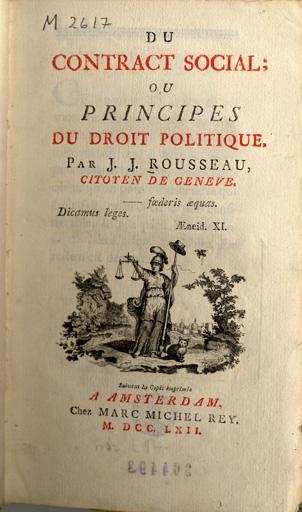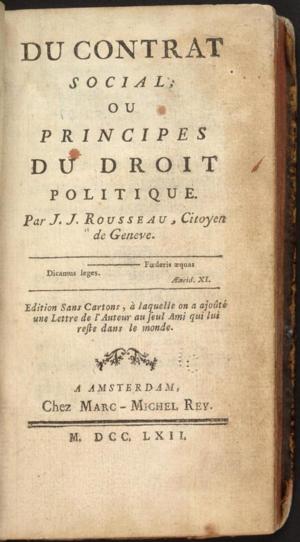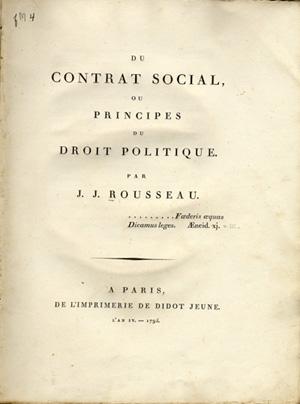Jean-Jacques Rousseau
Philosopher and writer, b. 28 June 1712 (Geneva, Switzerland), d. 2 July 1778 (Ermenonville, France).
 Rousseau's mother died when giving birth to him, and the young boy was brought up by his father, a watchmaker with pretensions of an upper-class lifestyle. When his father, after brandishing the sword he carried around as a sign of upper class stature, had to flee Geneva, Jean-Jacques was left in his mother's family, who treated him as a poor relation. At the age of 16 he walked away from the humiliating situation to Sardinia and France, where he met the Baroness of Warens, who converted him to Catholicism.
Rousseau's mother died when giving birth to him, and the young boy was brought up by his father, a watchmaker with pretensions of an upper-class lifestyle. When his father, after brandishing the sword he carried around as a sign of upper class stature, had to flee Geneva, Jean-Jacques was left in his mother's family, who treated him as a poor relation. At the age of 16 he walked away from the humiliating situation to Sardinia and France, where he met the Baroness of Warens, who converted him to Catholicism.
When he arrived at the estate of the baroness Rousseau had not had any formal education. The baroness, who was 12 years older than Rousseau, took him under her wing; Rousseau became a man of letters and an accomplished musician and for a period also her preferred lover.
In 1742 Rousseau went to Paris. He soon became the centre of a group of philosophers around the monumental project of the French Encyclopédie under the editorship of Diderot, to which he contributed many articles. He used his musical talents to compose an opera, Le Devin du Village ("The Cunning-Man"), which brought him the admiration of the court. The great debate with Rameau about the virtues of the French versus the Italian opera of 1752 increased Rousseau's standing at the court, and he could have easily settled into a life of ease as a composer of light entertainment.
But Rousseau was brought up a protestant, and a Calvinist at that, and throughout his life he could never quite free himself from the puritanistic rigour of protestant morals. In 1749, on his way to visit Diderot in prison - the writer had been accused of irreligious writing - he had what he called an "illumination": that humanity is good by nature but corrupted by the progress of society. He went home and wrote his first important philosophical work Discours sur les sciences et les arts (A
Discourse on the Sciences and the Art), which won him the price of the Academy of Dijon of 1750.
The belief in the natural goodness of humanity and the negative impact of society may seem at odds with the protestant teachings of man's original sin, but its consequences brought Rousseau back to his protestant roots: He saw the need for authority to keep the humans on the good path, and soon after the publication of his first work he found this authority again in Calvinist Geneva. In 1754 he returned to the city, where he was greeted with open arms, and reverted to Calvinism.
In 1755 the Academy of Dijon had set the theme: "What is the
origin of the inequality among men and is it justified by natural law?"
" It was a question perfectly set for Rousseau's thinking. In his Discours sur l'origine de l'inegalité (Discourse on the Origin of Inequality) he attempted to reconstruct human history from its state of innocence to the state observed during his days. He identified property as a "fatal concept" that caused many of the "horrors" of modern society.
Social revolutionaries of the 19th century, including Marx and Lenin, praised Rousseau for his assessment of the state of society. But Rousseau did not believe that the world could be changed into a better society; he was closer to Plato, who described a just society as one in which everyone was in his right place. Rousseau's next work Du Contrat social (The Social Contract) begins with the sentence "Man was born free, but he is everywhere in chains" and proceeds to describe a civil society where men find political liberty by obeying the self-imposed law.
Soon after publication of the Social Contract Rousseau retreated from the worldy city-life in Geneva and Paris into the country. He now concentrated on the question how to educate the individual to fit into the ideal society and wrote Émile and Julie: ou, la nouvelle Héloïse, two works that brought him the largest readership and greatest admiration. They also resulted in severe persecution by the church, not so much for their content - both describe how one can find happiness in family life in the limits set by the laws of class - but for their free and natural expression of love and emotions. Just as Rousseau's position against Rameau had signalled the end of an era in music, these two works signalled the end of the Age of Reason and the coming of Romanticism in literature.
Rousseau spent the last ten years of his life fleeing from France to Switzerland, where he was chased from canton to canton. Hume offered him refuge in England, but rising paranoia made Rousseau believe that the English including Hume made fun of him, and he returned to France in disguise. Eventually two French noblemen offered him protection on their estates, and Rousseau recovered his piece of mind before his death.
Among the philosophers of the European civilization Rousseau was the least academic and therefore one of the most influential. His ideas accelerated a change in the musical taste and in the arts, in the relationship between parents and children, the expression of feelings and in the appreciation of nature. Among his major works are:
Novels
- Julie: ou, la nouvelle Héloïse (1761; Julie: or, The New Eloise, 1968)
- Émile:
ou, de l'éducation (1762; Emile: or, On Education, 1979)
Essays
- Discours qui a remporté le prix à l'Académie de Dijon en l'année 1750; sur cette question proposée par la même académie si le rétablissement des sciences et des arts a contribué à épurer les moeurs (1750; Discourse on the Sciences and Arts, 1964);
- Discours sur l'origine et les fondements de l'inégalité parmi les hommes (1755; Discourse on Inequality, 1984)
- Du Contrat social (1762; The Social Contract, 1968)
- Considérations
sur le gouvernement de Pologne (1782; The Government of Poland, 1972)
- Lettres
élémentaires sur la botanique (1780; Letters on the Elements of Botany, 1785).
Letters
- J.J. Rousseau, citoyen de Genève, à M. d'Alembert, sur son article Genève dans le septième volume de
l'Encyclopédie, et particulièrement sur le projet d'établir un Théâtre de Comédie en cette ville (1758; Politics and the
Arts: Letter to M. d'Alembert on the Theatre, 1960)
- Lettres écrites de la montagne (1764)
Autobiography
- Rousseau juge de Jean-Jacques: dialogue (1780)
- Les Rêveries du promeneur
solitaire (1782; The Reveries of the Solitary Walker, 1979)
- Les Confessions (1782-89; The Confessions, 1953)
Reference
Cranston, M. (1995) Jean-Jacques Rousseau. Encyclopaedia Britannica 15th ed.
Three editions of Rousseau's Contrat Social.

The first edition printed in Amsterdam, Holland, while Rousseau was still in Switzerland. It carries the authorship "by J. J. Rousseau, citizen of Geneva."

Another edition from the same publisher and the same year, with the additional information "Edition without Cover, to which has been added a letter from the Author to the only Friend that he still has in the world."

The edition printed and published in Paris, France.
home
 Rousseau's mother died when giving birth to him, and the young boy was brought up by his father, a watchmaker with pretensions of an upper-class lifestyle. When his father, after brandishing the sword he carried around as a sign of upper class stature, had to flee Geneva, Jean-Jacques was left in his mother's family, who treated him as a poor relation. At the age of 16 he walked away from the humiliating situation to Sardinia and France, where he met the Baroness of Warens, who converted him to Catholicism.
Rousseau's mother died when giving birth to him, and the young boy was brought up by his father, a watchmaker with pretensions of an upper-class lifestyle. When his father, after brandishing the sword he carried around as a sign of upper class stature, had to flee Geneva, Jean-Jacques was left in his mother's family, who treated him as a poor relation. At the age of 16 he walked away from the humiliating situation to Sardinia and France, where he met the Baroness of Warens, who converted him to Catholicism.

